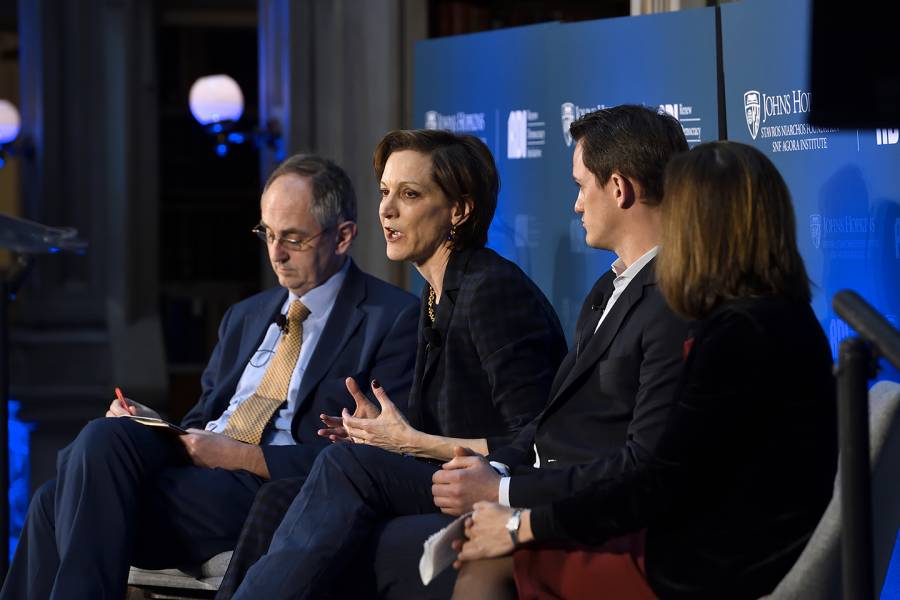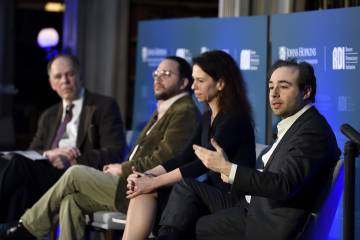Throughout her varied career—as a historian, journalist, and professor—Anne Applebaum has paid close attention to the evolving state of democracy in countries around the world. In recent years, that's meant witnessing and analyzing a pattern of erosion and breakdown.
"I've been watching, for a number of years, real problems crop up in the functioning of European democracies and, of course, in American politics as well," she says.
Rather than maintaining an intellectual detachment, however, Applebaum has plunged into the topic in search of answers and solutions. Her pointed columns for The Washington Post have sounded the alarm on the degradation of democratic institutions worldwide. And through ARENA—a research program she has directed at the London School of Economics for the past two years—Applebaum and colleagues have looked for counterresponses to the scourge of disinformation and propaganda feeding into these breakdowns.
The Pulitzer Prize–winning scholar will continue these pursuits as a senior fellow at the Stavros Niarchos Foundation Agora Institute at Johns Hopkins University, a public and academic forum dedicated to strengthening the ideals of democracy.
"The idea of devoting these kinds of resources and university backing to a big project that seeks to understand civil breakdown and look for solutions—linking academic work and advocacy together—seems to be an ideal place for me to continue to pursue these ideas and themes," says Applebaum, who will also have an appointment as a senior fellow at the university's School of Advanced International Studies in Washington, D.C.
Before her post as a professor of practice at the Institute of Global Affairs in the London School of Economics, Applebaum ran the Transitions Forum at the Legatum Institute in London from 2011 to 2015, focusing on growing threats to democracy. From there, she created the Democracy Lab website in partnership with Foreign Policy magazine.
Known for her expertise on the history of communism and post-communist Europe, Applebaum started her journalism career in 1988 as a Warsaw correspondent for The Economist. She has since worked as member of The Washington Post editorial board, foreign and deputy editor of Spectator magazine in London, and as columnist at Slate and several British newspapers.
Applebaum has authored six books, including Gulag: A History, a narrative account of Soviet concentration camps which won the Pulitzer Prize for nonfiction in 2004; and Iron Curtain: The Crushing of Eastern Europe, 1944-1956, which won the 2013 Cundill Prize for historical literature. Over the years, her writing has also appeared in publications including The New York Times, The Atlantic, The Wall Street Journal, The Guardian, and The National Review, among many others.
"Anne Applebaum's scholarly exploration of democratic societies and the modern-day ideological forces that threaten to undermine them is not only timely and topical, it is also precisely the kind of work that will support the mission of the SNF Agora Institute," Johns Hopkins University President Ronald J. Daniels said. "Her ability to write about these complex issues expertly and in a manner that helps people better understand them is critical to fostering much-needed dialogue and debate."
Applebaum earned her bachelor's degree in history and literature from Yale University, then her master's in international relations as a Marshall Scholar at the London School of Economics. She is both an American and Polish citizen, and fluent in Polish, Russian, and French.
At Johns Hopkins, she will teach courses at SAIS and the Krieger School of Arts and Sciences, including a class this fall titled Dictatorship, Dissidence and Democracy: Central Europe in the 20th Century. The course will examine communism and Stalinism in the region, tactics of dissent and the ideas behind them, and the struggle to democratize following the collapse of communism in 1989. The course will also include an exploration of the use of propaganda and violence by outsiders to affect political change in the region.
Applebaum is the second senior fellow appointed to the SNF Agora Institute, joining political scientist Yascha Mounk, whose arrival was announced in December. As an initial endeavor with the institute, Applebaum helped organize last month's Reawakening the Spirit of Democracy conference, a daylong event that brought together dozens of experts to assess the crisis of rising authoritarianism and populism in the U.S. and abroad.
"What's particularly impressive is the way SNF Agora seeks to be multidisciplinary, tapping people with different talents to approach these problems from different angles," Applebaum says. "The idea that these are not only academic research subjects but also that the institute is ambitious enough to be part of the public debate, including politicians, journalists, and others—that really appeals to me."
Posted in University News, Politics+Society
Tagged history, snf agora institute










